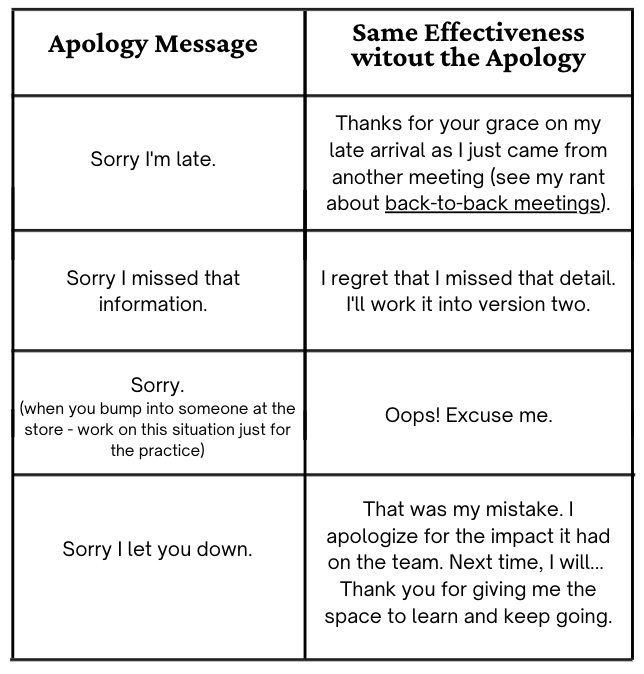How You Can Stop Apologizing
Recently, I presented at the Women in Tech conference in Boston. A conference about how, among other things, women in tech can lead powerfully, has inspired me to share my thoughts on how leaders can stop apologizing so much.
Why do leaders and rising leaders, especially women leaders, need to stop apologizing? It waters down the real message. You give away your power. It's often not circumstances in which you're actually sorry or would even do something differently next time. It's often just a demure habit.
The apology message says, in essence, "I'm failing. I screwed up. I did something I regret and would do differently next time." But would you, really? Yes, you're getting back to the person later than you would have liked, but prioritizing other things is part of the reality of hard choices at work.
The non-apology message in the table above says, "I appreciate your grace here. I'm human, and I can't do all the things at once. Email gets away from me sometimes, just as I'm sure it does for you."
In an interesting ironic twist, throwing apologies out willy-nilly is also a way we're at risk of letting ourselves off the hook, because after we say the word, we let it go rather than owning any desire for behavior change.. For example, "sorry I'm late" is a quick phrase spouted ad nauseum in American meetings millions of times per day. And then it's over, for the time being. And then we're late again. And we utter those words again. But are we really sorry? I'm guessing not really, evidenced by the lack of change.
So let's just own the fact that we're not sorry we're late, because we're human and we need to use the bathroom every once in a while, which takes a few minutes. Acknowledging the fact that we're late through showing appreciation for being granted some grace for our bladder rather than expressing regret is actually a way to own our behavior choices.
Here are a few more examples of how leaders can stop apologizing by replacing your reflexive apology message with some blend of gratitude, acknowledgement, and grace.
If you need a high-level concept to put in your back pocket, it's this:
Sorry —> Thank you
As you put this into practice today, start with email. Writing gives you time to think about your words so you can overcome habits more easily than during a live conversation.
Sometimes, though, apologies are necessary, as you can see in the last example above. The cool thing is, when you stop using the word "sorry" in situations where it's not necessary, the times you sincerely want to express remorse will become much more meaningful.



